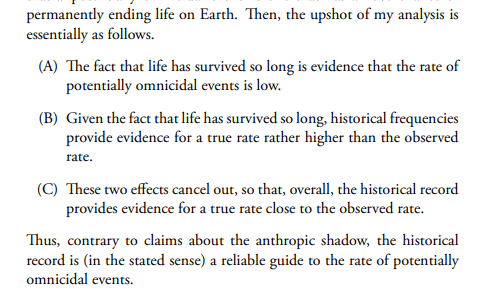This is a linkpost for Dispelling the Anthropic Shadow by Teruji Thomas.
Abstract:
There are some possible events that we could not possibly discover in our past. We could not discover an omnicidal catastrophe, an event so destructive that it permanently wiped out life on Earth. Had such a catastrophe occurred, we wouldn’t be here to find out. This space of unobservable histories has been called the anthropic shadow. Several authors claim that the anthropic shadow leads to an ‘observation selection bias’, analogous to survivorship bias, when we use the historical record to estimate catastrophic risks. I argue against this claim.
Upon a first read, I found this paper pretty persuasive; I'm at >80% that I'll later agree with it entirely, i.e. I'd agree that "the anthropic shadow effect" is not a real thing and earlier arguments in favor of it being a real thing were fatally flawed. This was a significant update for me on the issue.
Anthropic shadow effects are one of the topics discussed loosely in social settings among EAs (and in general open-minded nerdy people), often in a way that assumes the validity of the concept[1]. To the extent that the concept turns out to be completely not a thing — and for conceptual rather than empirical reasons — I'd find that an interesting sociological/cultural fact.


Oh, also, re the original paper, I do think that even given SSA, Teru's argument that Jack and Jill have equivalent epistemic perspectives is correct. (Importantly: As long as Jack and Jill uses the same SSA reference classes, and those reference classes don't treat Jack and Jill any differently.)
Since the core mechanism in my above comment is the correlation between x2 and the total number of observers, I think Jill the Martian would also arrive at different Pr(A) depending on whether she was using SSA or SIA.
(But Teru doesn't need to get into any of this, because he effectively rejects SSA towards the end of the section "Barking Dog vs The Martians" (p12-14 of the pdf). Referring to his previous paper Doomsday and objective chances.)